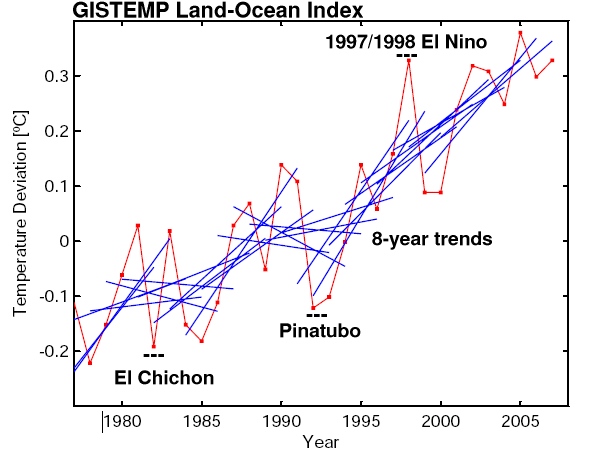Uncertainty, noise and the art of model-data comparison
Gavin Schmidt and Stefan Rahmstorf
John Tierney and Roger Pielke Jr. have recently discussed attempts to validate (or falsify) IPCC projections of global temperature change over the period 2000-2007. Others have attempted to show that last year's numbers imply that 'Global Warming has stopped' or that it is 'taking a break' (Uli Kulke, Die Welt)). However, as most of our readers will realise, these comparisons are flawed since they basically compare long term climate change to short term weather variability.
This becomes immediately clear when looking at the following graph:

The red line is the annual global-mean GISTEMP temperature record (though any other data set would do just as well), while the blue lines are 8-year trend lines - one for each 8-year period of data in the graph. What it shows is exactly what anyone should expect: the trends over such short periods are variable; sometimes small, sometimes large, sometimes negative - depending on which year you start with. The mean of all the 8 year trends is close to the long term trend (0.19�C/decade), but the standard deviation is almost as large (0.17�C/decade), implying that a trend would have to be either >0.5�C/decade or much more negative (< -0.2�C/decade) for it to obviously fall outside the distribution. Thus comparing short trends has very little power to distinguish between alternate expectations. So, it should be clear that short term comparisons are misguided, but the reasons why, and what should be done instead, are worth exploring.
The first point to make (and indeed the first point we always make) is that the climate system has enormous amounts of variability on day-to-day, month-to-month, year-to-year and decade-to-decade periods. Much of this variability (once you account for the diurnal cycle and the seasons) is apparently chaotic and unrelated to any external factor - it is the weather. Some aspects of weather are predictable - the location of mid-latitude storms a few days in advance, the progression of an El Ni�o event a few months in advance etc, but predictability quickly evaporates due to the extreme sensitivity of the weather to the unavoidable uncertainty in the initial conditions. So for most intents and purposes, the weather component can be thought of as random.
If you are interested in the forced component of the climate - and many people are - then you need to assess the size of an expected forced signal relative to the unforced weather 'noise'. Without this, the significance of any observed change is impossible to determine. The signal to noise ratio is actually very sensitive to exactly what climate record (or 'metric') you are looking at, and so whether a signal can be clearly seen will vary enormously across different aspects of the climate.
An obvious example is looking at the temperature anomaly in a single temperature station. The standard deviation in New York City for a monthly mean anomaly is around 2.5�C, for the annual mean it is around 0.6�C, while for the global mean anomaly it is around 0.2�C. So the longer the averaging time-period and the wider the spatial average, the smaller the weather noise and the greater chance to detect any particular signal.
EDIT
http://www.realclimate.org/index.php/archives/2008/01/uncertainty-noise-and-the-art-of-model-data-comparison/#more-523